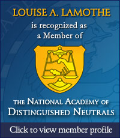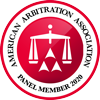Rising Star
Daily Journal California Law Business
By Liz Valsamis
In three short years, neutral Louise LaMothe has distinguished herself as someone with a comprehensive grasp on employment law, particularly on discrimination, disability issues.
Navigating the muddy waters of employment law in California requires the skill of a neutral well-versed in new case law. Touting her knowledge of recent decisions that have complicated employment law in California is how Louise LaMothe distinguishes herself from the hundreds of others neutrals in the state. And hooking up with a well-known case handler like New York’s American Arbitration Association doesn’t hurt either.
Nonetheless, after only three years in the field, LaMothe has won the praise of employment law attorneys on both sides of the fence. Plaintiffs’ attorney Dan Stormer of Pasadena’s Hadsell & Stormer has called LaMothe a “rising young star.”
LaMothe has spent most of her professional life at various law firms in Los Angeles law. During her 20 years in private practice, LaMothe practiced primarily with Irell & Manella as a commercial litigator.
She then set her sights on Riordan & McKinize and tried her hand at employment law. She finally launched her alternative dispute resolution practice when she joined the law firm of Bird Marella Boxer & Wolpert.
In 1999, LaMothe set up her own mediation shop in Santa Barbara where LaMothe, 54, lives with her husband, David Kaplan, and their 12-year-old son, Danny.
One recent afternoon, California Law Business reporter Liz Valsamis talked with LaMothe about her long career and the trends facing neutrals in labor and employment law.
Liz Valsamis: Do you expect the ADR community to get more employment cases in light of the recent layoffs in corporate America?
Louise LaMothe: I do think that there are more cases coming to employment ADR due to the layoffs. The problem for many of the laid-off employees, though, is that the employer is out of business. For that reason, though they may have claims, they may not be able to obtain relief.
Valsamis: What type of employment law disputes are you seeing more of?
LaMothe: The typical cases are failure to accommodate a physical disability, though I have seen a few psychological disability cases. The psychological disability claims seem to be the ones growing most rapidly.
Valsamis: Is there any recent court ruling that is affecting the ADR employment practice dramatically?
LaMothe: Yes, I’m seeing a lot more Americans with Disabilities Act cases. We are going to have to tease apart the impact of the U.S. Supreme Court’s decision in Circuit City as it is related to Armendariz, which was decided in the California Supreme Court. [Circuit City Stores Inc. v. Adams, 2001 DJDAR 2849 (U.S. March 21, 2001); Armendariz v. Foundation Psychare Inc., 24 Cal.4th 83 (2000).]
I think there is a conflict there based on the fact that the Circuit City case would seem to say that efforts on the part of the state to change the rules for employment arbitration might be trumped by federal law. And so we are just now beginning to understand how we read those cases together.
Valsamis: Is there any type of employment law dispute that you think belongs in court, rather than before a neutral?
LaMothe: The cases that belong in court are those with constitutional implications or those that test important legal precedent. The vast majority of employment cases I see are not in those categories. For them, ADR is quicker and more satisfactory.
Valsamis: How do the parties in employment disputes usually respond to the ADR process? Do you use a special technique to calm their nerves?
LaMothe: The individual parties in employment cases are frequently emotional. They feel wronged and even betrayed. I find that if given a chance to explain their positions, they feel better. I allow this to happen even in the arbitration context; the ability to vent their feelings sometimes helps them to let go of their dispute.
Valsamis: What’s your philosophy for mediating and arbitrating employment cases?
LaMothe: As an arbitrator, I just listen, ask clarifying questions to be sure I understand every point, and then issue an award that is fair based on the law and the unique situation before me. I explain my decisions fully. As a mediator, my mantra is patience, good humor and tenacity. I frequently tell stories from my own experience to give perspective to the parties in their own dispute.
Valsamis: Is there anything that lawyers do in mediation or arbitration that annoy you?
LaMothe: Any lawyer working with me should avoid disrespect to the other side – as is often said, we need to be “tough on the problem and easy on the people.” Personal animosity between lawyers degrades the entire process.
Also, every lawyer working with me needs to be prepared and make sure her client is prepared, too. It’s very difficult to make progress as a mediator in helping parties settle a case when they have not completed their own homework and have no real basis for the value they place on the case.
Valsamis: When did you first become interested in employment law?
LaMothe: My interest in employment law started in the 1970s. When I went to law school there were no women professors, none, and very few female law students. Back then, we were interested in civil rights and the Vietnam War. But when I got into the work force, I immediately saw what happened to women in terms of employment issues. And so, I think my first interest in this whole area of employment law really started with these gender equality issues in the ’70s.
I wrote about the advancement of women in law firms a lot. I spoke on it and I gave lectures on it constantly. All of those issues dealt with discrimination, and so from there I really branched out into other components of employment law. But it was really that early work that I did on the advancement of women in law firms and gender equality that gave me this very strong interest in this whole area of discrimination.
Valsamis: Did you ever face discrimination firsthand?
LaMothe: Yes, in the employment context when I first began to practice. I ran into discrimination from judges in a very early federal court case that I worked on in the district court in Los Angeles. I had not previously been admitted to practice in the Los Angeles district court though I had been admitted to practice in the other district courts around the country. So the partner in my law firm, which was Irell at the time, wanted to move my admission before the district court at the beginning of the motion calendar in federal court that day. He didn’t think there would be any difficulty at all.
But when he stood up and asked to move my admission, and the courtroom was full of lawyers on our case, [the judge] looked down and asked, “Why did you pick me to get admitted before? Everyone knows how I feel about women practicing law.”
And then I got, what I have referred to in years since, the barefoot-and-pregnant speech. It was 1974. You can imagine how humiliated I was. I couldn’t do or say anything because I didn’t want what I said to [lead to] the detriment of our client. So I just had to take it.
At that point, I was a third-year associate. I was about 27.
Those types of early experiences in the practice were not only disappointing but very critical to my development.
Valsamis: What was your area of expertise when you were in private practice?
LaMothe: Mostly large-scale commercial litigation. But what happened, starting in the late ’80s, I began to do some employment litigation on the management side and, including, some in the entertainment area. And so I began to work my way into the employment area. … I did a lot of internal investigation for employers when there were claims of harassment.
Valsamis: Why did you leave private practice to become a neutral?
LaMothe: I really do love the law and I didn’t want to get out of it. There was a time in my life when a lot of people would have chosen to go on the bench. But, given my family circumstances, it made a lot more sense to have a lot more flexibility in my professional life. So becoming a neutral allowed me to use the legal skills that I have developed while at the same time having this flexibility. As you’ve noticed the life of a lawyer is very frenzied.
Valsamis: How do you set yourself apart in this competitive field?
LaMothe: I think one thing that separates me from other ADR neutrals in the employment area is my experience on both sides of employment law as it relates to discrimination. Most lawyers, in my experience, have represented only one side in employment disputes. I have lectured and written extensively about discrimination, particularly as it relates to women, and I have represented management.
Valsamis: What do you most enjoy about your work?
LaMothe: I particularly enjoy the mediation that I do in the employment area. When you are successful in helping parties settle, the happiest person is the employer because I think the people tend to be very invested in their employment cases. It is, after all, a very important relationship for most people.
© The Daily Journal Corporation. All rights reserved.





